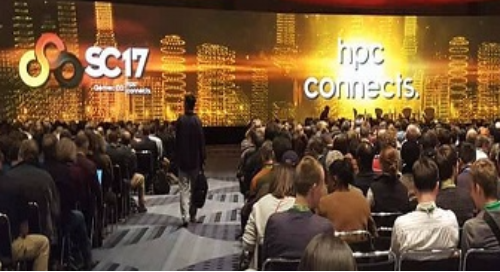
At SC17, I was fortunate enough to attend Smart Cities – Reimagining Urban Life with High-Performance Computing, the opening plenary session. For those who don’t know, smart cities have been a major topic of discussion over the last few years, especially with numerous competitions and funding initiatives being invested into the concept. For smart cities to become a reality we need to think of them as integrated systems and use resources and data to address issues, like traffic congestion, poverty, public transportation, and free Wi-Fi access to all, to name a few.
During the opening session, a panel of experts discussed the emerging needs and opportunities of smart cities, suggesting an increasing role for HPC in cities, with perspectives from city government, planning and design and embedded urban HPC systems. Speakers included:
According to the panelists, smart cities are currently just a dream. Until adequate resources are allocated and city leadership buys in to the idea, smart cities will not become a reality. However, cities are becoming more critical to our existence. Eventually, 80% of the population will live in cities, making it critical to optimize and enhance services key to their success. The panelists agreed that we need to ask ourselves, how do we apply HPC and computer science capabilities to address the issues that cities are facing now and in the future.
From the session, there were countless takeaways! Significant key takeaways included understanding that cities are made up of integrated systems, there is a new emphasis machine learning, and that high-performance computing is the future of smart cities.

The first key takeaway from the session was that cities are not monolithic, they are integrated systems that need to be analyzed both individually and as a whole. For smart city initiatives to be successful, investments are needed to analyze data across all of the city services to help maintain smart city services. Smart partnerships with different city sectors, skills, and expertise can be used to find new ways to solve problems.
The Atlanta Police Department has a partnership with Georgia Technical University that allows the department to train better and predict crime zones using machine learning.
Another takeaway was the new profound emphasis cities have on machine learning. Machines, artificial intelligence, and high performance computing allow cities to analyze data efficiently. As an example, Seattle, Washington is expected to grow by 32% over the next 10 years, and the city wants to become carbon neutral by 2050. To address the growing population, optimize city services, and become more efficient, the city is investing in numerous smart city initiatives. One of which is a rain gauge sensor deployed across the city. With the rain gauges, the city learned that throughout Seattle there are micro climates resulting in different amounts of rainfall across the city. In one location, there was an 8-inch differential from the city average. This let the city understand where they need to make investments in infrastructure to prepare for flooding.
Overall, the biggest takeaway from this session was that high-performance computing on the edge is the future of smart cites. This technology enables smart and connected communities to better plan for infrastructure and maintenance. HPC is already playing a key role in helping cities pursue smart objectives. Intelligent devices enabled with HPC “at the edge” have the potential to optimize energy generation and delivery, emergency response, the flow of goods and services, and to allow urban infrastructures to adapt autonomously to changes and events such as severe storms or traffic congestion.
Chicago, Illinois is utilizing the Array of Things, an urban science instrument, and multiple IoT sensors that measure various things. There will be over 500 of these devices in Chicago by 2019. It’s all possible because of edge computing, HPC machine learning, open source, and novel sensors!
Before the experts concluded the discussion, they answered one more question for us attendees, “How will we know when we’ve achieved smart cities, that our work paid off?” Their answers:
For more information on the session please view the press release, Supercomputing Opening Plenary Announced: The Era of Smart Cities – Reimagining Urban Life with HPC.
If you’d like to learn more about smart cites, please view these resources: